【配套K12】高三英语 专题复习 Unit 2 Language reading(第2课时)教案 牛
(全国通用)高考英语一轮复习Unit2Language讲义(含解析)牛津译林版必修3
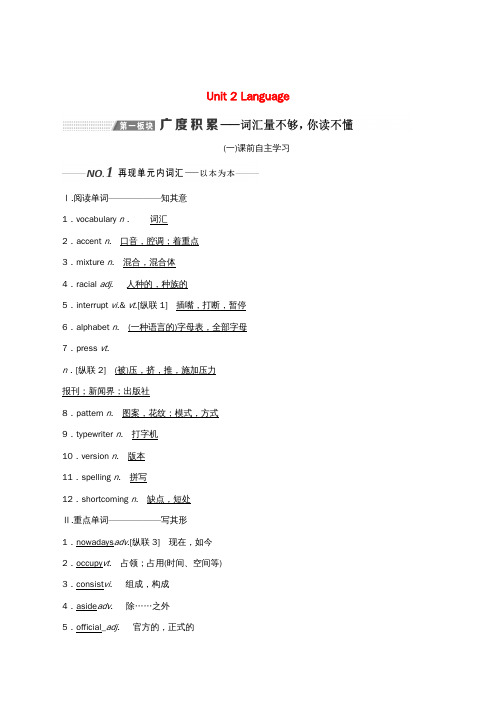
Unit 2 Language(一)课前自主学习Ⅰ.阅读单词——————知其意 1.vocabulary n. 词汇 2.accent n. 口音,腔调;着重点 3.mixture n. 混合,混合体 4.racial adj. 人种的,种族的 5.interrupt vi.& vt.[纵联 1] 插嘴,打断,暂停 6.alphabet n. (一种语言的)字母表,全部字母 7.press vt. n.[纵联 2] (被)压,挤,推,施加压力 报刊;新闻界;出版社 8.pattern n. 图案,花纹;模式,方式 9.typewriter n. 打字机 10.version n. 版本 11.spelling n. 拼写 12.shortcoming n. 缺点,短处 Ⅱ.重点单词——————写其形 1.nowadaysadv.[纵联 3] 现在,如今 2.occupyvt. 占领;占用(时间、空间等) 3.consistvi. 组成,构成 4.asideadv. 除……之外 5.official_adj. 官方的,正式的6.defeatvt. 击败,战胜 7.replacevt. 替换,代替,取代 8.raisevt. 养育,培养;举起;增加,提高;筹募;提及 9.thereforeadv. 因此,所以 10.processn. 过程;进程 11.distinctionn. 区别,差别 12.banvt. & n. 禁止;取缔 13.uniqueadj. 独特的 14.charactern. (书写或印刷)文字,符号;人物;性格 15.conclusionn. 结论;推论 16.customn. 风俗,习俗 17.appearancen. 外观,外貌 18.representvt. 代表;展示,描绘 19.indicatevt. 显示,表示;象征,暗示 20.thusadv. 以此方式,如此;因此,从而 21.entireadj.[纵联 4] 完全的,整个的 Ⅲ.拓展单词——————通其变 1.contribution n.贡献,促成因素;捐赠→contributev.贡献 2. concern n. 关 心 ; 忧 虑 vt.涉 及 ; 使 担 忧 ; 对 ……感 兴 趣 →concernedadj.担 心 的 , 关 心 的 →concerningprep.关于 3.access vt.进入;使用 n.通道;(使用的)机会,权利→accessibleadj.可到达的;可接近的;可利用 的 4.embarrass vt.使尴尬,使难堪→embarrassingadj.令人难堪的,使人尴尬的→embarrassedadj.感到 尴尬的,难堪的 5.mistaken adj.错误的;误解的→mistaken.错误;误会 vt.弄错;误解 6.differ vi.相异,有区别→differentadj.不同的→differencen.不同 7.simplify vt.简化→simpleadj.简单的8.combine vt.& vi.组合;(使)联合→combinationn.联合,结合 9.distinguish vt.区分,辨别;使具有某种特征→distinguishedadj.著名的→distinguishableadj.可区分 的,可辨别的 10.convenient adj.方便的→conveniencen.方便 11.practical adj.切实可行的,实用的→practicen.实践,练习 v.练习;实习;实行纵联 1.巧记“inter(相互)”词族 ①intersect v.相交,交叉 ②interaction n.相互影响 ③international adj.国际的 ④interchange v.相互交换 ⑤interact v. 互相来往 ⑥interrupt vi.& vt. 插嘴,打断 纵联 2.“press”家族 ①press v.按;压 n.报刊;新闻界;出版社 ②pressure n.压力 ③impress v.留下印象 ④impression n.印象 ⑤express v.表达 ⑥expression n.表达;表情 纵联 3.“目前,如今”知多少 ①nowadays 如今 ②at present 目前 ③at the present time 目前 ④at the moment 此刻 ⑤at the current time 当前 纵联 4.拜访“完全”家族 ①entire adj.整个的 ②whole adj.全部的 ③total adj.完全的 ④wholly adv.完全地 ⑤complete adj.完全的单元话题——语言学习子话题 1 学习内容 ①idiom n. 成语,习语 ②tone n. 腔调;语调 ③stress n. 重音 ④native/mother tongue 母语 ⑤official language 官方语言 ⑥oral/spoken English 英语口语 ⑦written English 书面英语 子话题 2 学习行为 ①drill n.& vi. 训练,操练 ②skim vt.& vi. 跳读;略读 ③scan vt.& vi. 扫读;浏览 ④accumulate vt.& vi. 积累;积聚 ⑤refer to/consult a dictionary 查字典 ⑥form the habit of reading 养成阅读习惯 ⑦enlarge/expand one's vocabulary 扩大某人的词汇量 子话题 3 学习结果 ①grasp vt. 领会;抓住 ②master vt. 精通,掌握 ③accurate adj. 准确的,精确的 ④fluent adj. (外语)流利的,流畅的 ⑤abundant adj. 大量的,充裕的 ⑥pick up 学得;拾起,捡起;接收 ⑦acquire skills/knowledge 获得技能/知识[学考对接·活学活用] 高考采撷(一) 阅读中的词汇应用 1. (2015·广 东 高 考 阅 读 D)It was once common to regard Britain as a society with class __❶__(distinct). Each class had unique characteristics❶ ... One unchanging aspect of a British person's classposition is accent❶. The words a person speaks tell❶ her or his class. A study of British accents during the1970s found that a voice sounding like a BBC newsreader was viewed as the most attractive voice.①用所给词的适当形式填空:distinction②写出加黑词在本单元的同根同义词:character③选择加黑词在句中的意思:__A__A.口音 B.重音 C.强调④tell 在本单元的同义词是:distinguish,前者常和 from 搭配,后者常和 between 搭配。
【配套K12】高三英语一轮 综合复习 外研版必修2
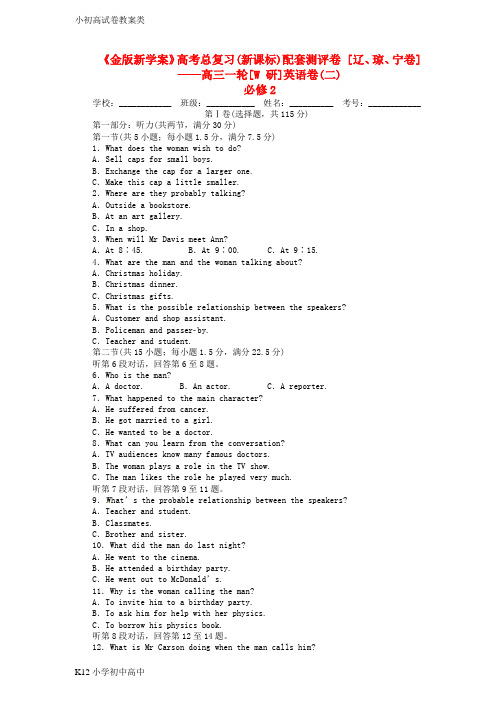
《金版新学案》高考总复习(新课标)配套测评卷 [辽、琼、宁卷]——高三一轮[W 研]英语卷(二)必修2学校:____________ 班级:___________ 姓名:__________ 考号:____________第Ⅰ卷(选择题,共115分)第一部分:听力(共两节,满分30分)第一节(共5小题;每小题1.5分,满分7.5分)1.What does the woman wish to do?A.Sell caps for small boys.B.Exchange the cap for a larger one.C.Make this cap a little smaller.2.Where are they probably talking?A.Outside a bookstore.B.At an art gallery.C.In a shop.3.When will Mr Davis meet Ann?A.At 8∶45.B.At 9∶00.C.At 9∶15.4.What are the man and the woman talking about?A.Christmas holiday.B.Christmas dinner.C.Christmas gifts.5.What is the possible relationship between the speakers?A.Customer and shop assistant.B.Policeman and passerby.C.Teacher and student.第二节(共15小题;每小题1.5分,满分22.5分)听第6段对话,回答第6至8题。
6.Who is the man?A.A doctor. B.An actor. C.A reporter.7.What happened to the main character?A.He suffered from cancer.B.He got married to a girl.C.He wanted to be a doctor.8.What can you learn from the conversation?A.TV audiences know many famous doctors.B.The woman plays a role in the TV show.C.The man likes the role he played very much.听第7段对话,回答第9至11题。
【推荐K12】2018_2019学年高中英语Unit2EnglisharoundtheworldSectionⅢLearningaboutLanguage
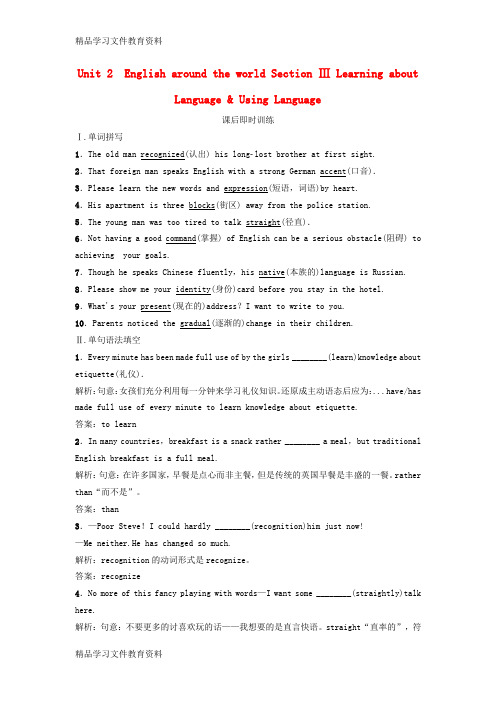
Unit 2 English around the world Section Ⅲ Learning aboutLanguage & Using Language课后即时训练Ⅰ.单词拼写1.The old man recognized(认出) his longlost brother at first sight.2.That foreign man speaks English with a strong German accent(口音).3.Please learn the new words and expression(短语,词语)by heart.4.His apartment is three blocks(街区) away from the police station.5.The young man was too tired to talk straight(径直).6.Not having a good command(掌握) of English can be a serious obstacle(阻碍) to achieving your goals.7.Though he speaks Chinese fluently,his native(本族的)language is Russian. 8.Please show me your identity(身份)card before you stay in the hotel. 9.What's your present(现在的)address?I want to write to you.10.Parents noticed the gradual(逐渐的)change in their children.Ⅱ.单句语法填空1.Every minute has been made full use of by the girls ________(learn)knowledge about etiquette(礼仪).解析:句意:女孩们充分利用每一分钟来学习礼仪知识。
【配套K12】[学习]2018秋高中英语 Unit 2 English around the wor
![【配套K12】[学习]2018秋高中英语 Unit 2 English around the wor](https://img.taocdn.com/s3/m/2ce94a2aeff9aef8951e060f.png)
Unit 2 English around the world话题诵读日积月累The history of the English language really started with the arrival of three Germanic tribes(部落)who invaded(侵略)Britain during the 5th century.Old EnglishThe invading Germanic tribes spoke similar languages,which in Britain developed into what we now call Old English.Old English didn't sound or look like English today.Native English speakers now would have great difficulty understanding Old English speakers.However,about half of the most commonly used words in Modern English have Old English roots.Middle EnglishIn 1066,the Norman invaded and conquered England.They also brought with them a kind of French,which became the language of the ruling and business classes.For a period,the lower classes spoke English and the upper classes spoke French.In the 14th century,English became a main language in Britain again,with many French words added.This language is called Middle English.Late Modern EnglishThe main difference between Early Modern English and Late Modern English is te Modern English has many more words,resulting from two main factors:firstly,technology development created a need for new words;secondly,the British Empire at its height converted one quarter of the earth's surface,and the English language used foreign words from many countries.Now there are many other varieties of English in the world,such as Australian English,New Zealand English,Canadian English,South African English,Indian English and Caribbean English.[词海拾贝]1.arrival n.到达2.period n.时期;阶段3.class n.阶层4.result from 因……发生;随……产生5.create v. 生产;制造[问题思考]1.The main idea of the text is ____________________________.答案:the history of the English language2.When is English called Middle English?_______________________________________________________答案:In the 14th century.3.What's the main difference between Early Modern English and Late Modern English?_______________________________________________________答案:Vocabulary.自主预习步步提高词汇识记Ⅰ.将单词与其正确释义配对1.official adj. A.本身;本体;身份2.native adj.&n. B.常常;频繁地3.actually adv. C.官方的;正式的;公务的4.base vt.& n. D.逐渐地;逐步地5.gradually adv. E.流利的;流畅的6.vocabulary n. F.以……为根据;基部;基地;基础7.spelling n. G.拼写;拼法8.identity n. H.本国的;本地的;本地人;本国人9.fluent adj. I.实际上;事实上10.frequently adv. J.词汇;词汇量;词表答案:1.C 2.H 3.I 4.F 5.D 6.J 7.G 8.A9.E 10.BⅡ.根据所给汉语提示写出单词1.________adj. 官方的;正式的;公务的2.________n. 航行;航海3.________adj. 本国的;本地的n.本国人;本地人4.________adv. 事实上;实际上5.________vt. 以……为根据n.基部;基础;基地6.________adj. 逐渐的;逐步的________adv. 逐渐地;逐步地7.________adj. 较后的;(两者中)后者的;后半的8.________n. 本身;本体;身份9.________adj. 流利的;流畅的________adv. 流利地;流畅地10.________adj. 频繁的;常见的________adv. 常常;频繁地答案:1.official 2.voyage 3.native 4.actually 5.base6.gradual gradually tter 8.identity 9.fluent fluently 10.frequent frequentlyⅢ.根据汉语提示写出正确的单词1.This ________(后者的) point was important.2.The ship—Titanic sank on its first________(航行).3.They bought some new furniture to furnish their new________(公寓).4.This tree looks high and strong but________(实际上) its trunk is hollow.5.If your________(词汇) is small,you will be bad in English.6.She received several________(正式的) letters this morning.7.The________(身份) of the killer is still unknown.8.She was born in Germany and her________(本国的)language is German.答案:tter 2.voyage 3.apartment 4.actually5.vocabulary 6.official 7.identity 8.nativeⅣ.根据语境选词填空1.She has a ______English and can speak English ______,for which we all admire her very much.(fluently/fluent)2.Losing weight is a slow,__________ process,so________she has become slimmer and slimmer.(gradually/gradual)3.The________of the word is difficult,but the correct pronunciation of it can help to________it.(spell/spelling)4.Our efforts are beginning to have an________effect,and ________the effect has made a great difference.(actual/actually)5.He is a ________ visitor to the house;that is,he visits the house________.(frequent/frequently)6.It is the responsibility of every person to keep certain ________ principles,which means every action should be________ on a certain principle.(based/basic) 答案:1.fluent fluently 2.gradual gradually 3.spelling spell 4.actual actually 5.frequent frequently6.basic based语篇理解Ⅰ.Skimming for the main information1.What does the passage tell us?A.The brief history of the English language.B.The Modern English based more on German.C.The old English based more on French.D.English spoken in English.答案:A2.Find out the main idea of each paragraph.Para.1______ A.All languages change when cultures communicate with one another.So does English.Para.2______ B.How English spread(传播) in the past.Para.3______ C.Native English speakers can understand each other even if they don't speak the same kind of English.Para.4______ D.By the 19th century,two big changes in English spelling happened.Para.5______ E.English is spoken in many countries.答案:Para.1—B Para.2—C Para.3—APara.4—D Para.5—EⅡ.Scanning for detailed information1.How was the English spoken in England between about AD 450 and 1150?A.It was the same as the English spoken at present.B.It was more like French.C.It was based more on German.D.It was more like Danish.2.Why was Shakespeare able to make use of a wider vocabulary by the 1600's?A.Because new settlers enriched the English language and especially its vocabulary.B.Because Shakespeare made up many new words.C.Because British settlers moved to different countries.D.Because a new dictionary was written.3.What happened to American English in the 19th century?A.It became more like British English.B.It became more like German.C.It had its own dictionary.D.Its spelling was given a separate identity.4.Which of the following is NOT true?A.English is one of the official languages in India.B.English developed when new settlers and rulers came to Britain.C.China has the largest number of English speakers.D.Now more people speak English as their first,second or a foreign language.答案:1.C 2.A 3.D 4.CⅢ.Intensive reading to finish the passageAt the end of the 16th century, English was only spoken by people from 1.______.They were native speakers.Today,the largest 2.______ of people speaking English may be in China.A lot of Chinese people speak English 3.______their foreign language.The 4.______ language has changed quite a lot over the last four centuries.Old English sounded more like German for it was 5.______on German,but modern English 6.________ more like French than German because England was once ruled by the French.Those settlers 7.______the language, so Shakespeare could make use of a wider 8.______ by the 1600's.Two people had great effects on the English settlement.One was Samuel Johnson, who wrote his 9.________,and the other was Noah Webster, who later wrote The American Dictionary of the English Language, which gave American English its own 10.______.答案:1.England 2.number 3.as 4.English5.based 6.sounds 7.enriched 8.vocabulary9.dictionary 10.identity[阅读素养提升]Why do you think people all over the world want to learn English?(various answers)______________________________________________________________________________________________________________答案:They may include any of these reasons:to use computers and the Internet,to trade,to learn in Western universities,to read academic journals,etc.[精读难句透析]1.At first the English spoken in England between about AD 450 and 1150 was very different from the English spoken today.分析:此句为复杂的简单句。
【配套K12】高考英语一轮复习 Unit2单元测试 新人教版选修8
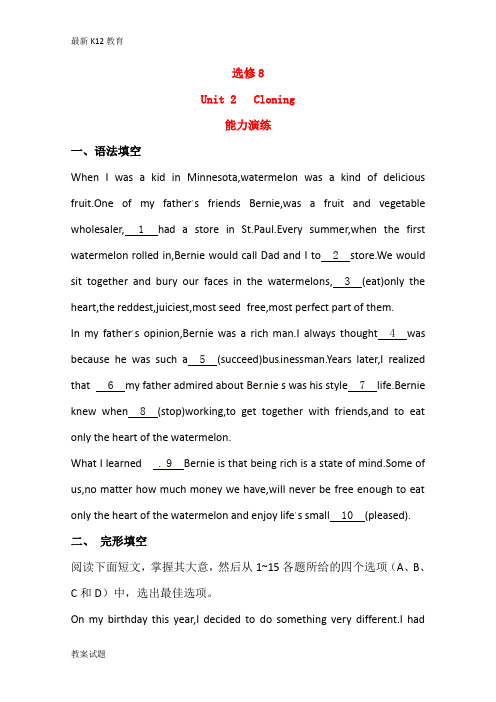
选修8Unit 2 Cloning能力演练一、语法填空When I was a kid in Minnesota,watermelon was a kind of delicious fruit.One of my father,s friends Bernie,was a fruit and vegetable wholesaler, 1 had a store in St.Paul.Every summer,when the first watermelon rolled in,Bernie would call Dad and I to 2 store.We would sit together and bury our faces in the watermelons, 3 (eat)only theheart,the reddest,juiciest,most seed free,most perfect part of them.In my father,s opinion,Bernie was a rich man.I always thought 4 was because he was such a 5 (succeed)businessman.Years later,I realized that 6 my father admired about Bernie,s was his style 7 life.Bernie knew when 8 (stop)working,to get together with friends,and to eat only the heart of the watermelon.What I learned 9 Bernie is that being rich is a state of mind.Some of us,no matter how much money we have,will never be free enough to eatonly the heart of the watermelon and enjoy life,s small 10 (pleased).二、完形填空阅读下面短文,掌握其大意,然后从1~15各题所给的四个选项(A、B、C和D)中,选出最佳选项。
推荐学习K12高考英语一轮复习 Unit2单元测试 新人教版必修4
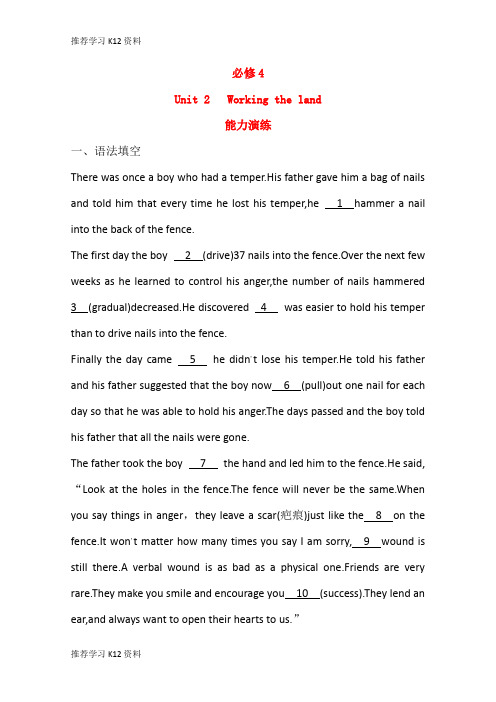
必修4Unit 2 Working the land能力演练一、语法填空There was once a boy who had a temper.His father gave him a bag of nails and told him that every time he lost his temper,he 1 hammer a nailinto the back of the fence.The first day the boy 2 (drive)37 nails into the fence.Over the next few weeks as he learned to control his anger,the number of nails hammered 3 (gradual)decreased.He discovered 4 was easier to hold his temperthan to drive nails into the fence.Finally the day came 5 he didn,t lose his temper.He told his father and his father suggested that the boy now 6 (pull)out one nail for each day so that he was able to hold his anger.The days passed and the boy told his father that all the nails were gone.The father took the boy 7 the hand and led him to the fence.He said,“Look at the holes in the fence.The fence will never be the same.When you say things in anger,they leave a scar(疤痕)just like the 8 on the fence.It won,t matter how many times you say I am sorry, 9 wound is still there.A verbal wound is as bad as a physical one.Friends are very rare.They make you smile and encourage you 10 (success).They lend anear,and always want to open their hearts to us.”二、完形填空阅读下面短文,掌握其大意,然后从1~15各题所给的四个选项(A、B、C和D)中,选出最佳选项。
配套K12高三英语 专题复习 Unit 2 Language reading(第2课时)教案 牛津译
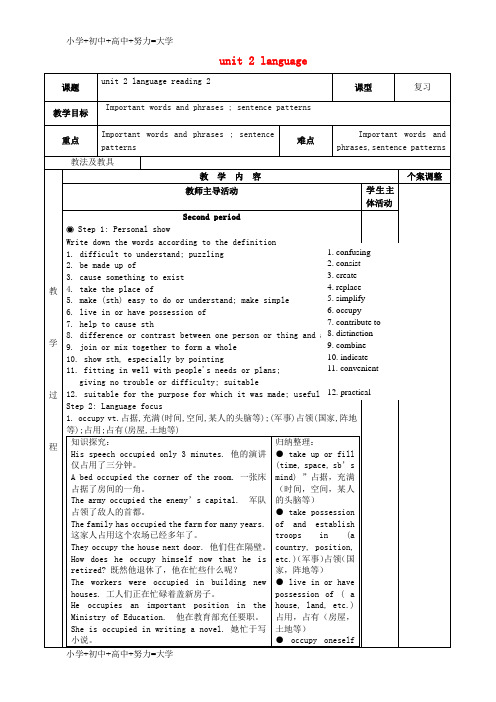
A. consisted of B. was consisted of C. made up of D. was
consisting of
B) 2. As we know, a chess set ________ 32 chessmen.
A. consists in B. consists of
C. is consisted in D. is
难点
Important words and phrases,sentence patterns
教法教具
教学内容
教师主导活动
学生主 体活动
Second period
Step 1: Personal show
Write down the words according to the definition
sth.
Occupation (n.)
(1) Teaching is my occupation. 职 业 , 专 业 = I am a teacher by
occupation.
(2) No one is yet in occupation of the house. 占有
Occupied (adj.) 在使用中,已占有,不空闲
成员组成。
3. contribute
知识探究:
归纳整理:
Does smoking contribute to lung cancer? 吸 contribute to 是…
烟会导致肺癌吗? Your suggestion has greatly contributed to
the accomplishment of our work.
(3)be made up of 表示“……由……组成”,这里为被动形式,表示“一个整
【配套K12】高考英语一轮复习 Unit2单元测试
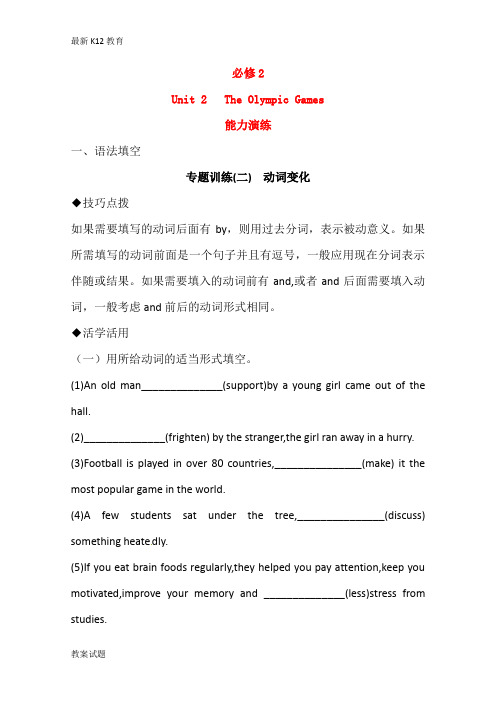
必修2Unit 2 The Olympic Games能力演练一、语法填空专题训练(二) 动词变化◆技巧点拨如果需要填写的动词后面有by,则用过去分词,表示被动意义。
如果所需填写的动词前面是一个句子并且有逗号,一般应用现在分词表示伴随或结果。
如果需要填入的动词前有and,或者and后面需要填入动词,一般考虑and前后的动词形式相同。
◆活学活用(一)用所给动词的适当形式填空。
(1)An old man______________(support)by a young girl came out of thehall.(2)______________(frighten) by the stranger,the girl ran away in a hurry.(3)Football is played in over 80 countries,_______________(make) it themost popular game in the world.(4)A few students sat under the tree,_______________(discuss) something heatedly.(5)If you eat brain foods regularly,they helped you pay attention,keep you motivated,improve your memory and ______________(less)stress fromstudies.(二)阅读下面短文,根据文意,用所给动词的适当形式填空,注意动词形式变化。
Odysseus is a literary figure in the Odyssey 1 (write)by Homer.He rejected the comfortable life of a Greek king and 2 (make)a promise to help another Greek leader,Menelaus,get his wife back.But the war 3 (drag)on and on and he was away from his family for ten years.During this time the fortunes of the war were so changeable that no one could predict who would win.Odysseus became 4 (tire)of the war and the delay in Troy.He urgently wanted to return home,so when the Greek kings had the regular weekly meeting he suggested that they take an opportunity 5 (trick)the Trojans.The Greeks built a giant wooden horse so that men could hide inside it.The Greeks then pretended to leave aboard their ships as if they 6 (discourage)by the length of the war.The Trojans blessed their God for their good fortune and 7 (prepare)to celebrate. That night the men climbed out of the horse and 8 (open)the city gates to the Greek army.The Greeks marched into Troy, 9 (announce)the Greek victory.10 (awake)by the bell,the Trojans had to face the punishment whichseemed endless.二、完形填空阅读下面短文,掌握其大意,然后从1~15各题所给的四个选项(A、B、C和D)中,选出最佳选项。
【配套K12】高三英语 专题复习 Unit 2 Language学案(无答案)牛津译林版必修3
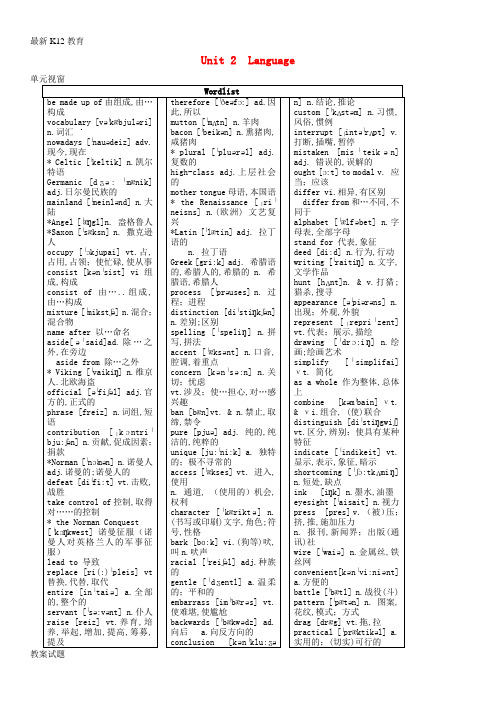
最新K12教育Unit 2 Language单元视窗Wordlistbe made up of由组成,由…构成vocabulary [vəˈkæbjuləri] n.词汇nowadays [ˈnauədeiz] adv.现今,现在* Celtic [ˈkeltik] n.凯尔特语Germanic [dʒə: ˈmænik] adj.日尔曼民族的mainland [ˈmeinlənd] n.大陆*Angel [ˈæŋgl]n. 盎格鲁人*Saxon [ˈsæksn] n. 撒克逊人occupy [ˈɔkjupai] vt.占,占用,占领;使忙碌,使从事consist [kənˈsist] vi组成,构成consist of由…..组成,由…构成mixture [ˈmikstʃə] n.混合;混合物name after 以…命名aside[əˈsaid]ad.除…之外,在旁边aside from 除…之外* Viking [ˈvaikiŋ] n.维京人.北欧海盗official [əˈfiʃəl] adj.官方的,正式的phrase [freiz] n.词组,短语contribution [ˌkɔntriˈbju:ʃən] n.贡献,促成因素;捐款*Norman [ˈnɔːmən] n.诺曼人adj.诺曼的;诺曼人的defeat [diˈfi:t] vt.击败,战胜take control of控制,取得对……的控制* the Norman Conquest [ˈkɔŋkwest] 诺曼征服(诺曼人对英格兰人的军事征服)lead to 导致replace [ri(:)ˈpleis] vt 替换,代替,取代entire [inˈtaiə] a.全部的,整个的servant [ˈsə:vənt] n.仆人raise [reiz] vt.养育,培养,举起,增加,提高,筹募,提及therefore [ˈðeəfɔ:] ad.因此,所以mutton [ˈmʌtn] n.羊肉bacon [ˈbeikən] n.熏猪肉,咸猪肉* plural [ˈpluərəl] adj.复数的high-class adj.上层社会的mother tongue母语,本国语* the Renaissance [ˌriˈneisns] n.(欧洲) 文艺复兴*Latin [ˈlætin] adj. 拉丁语的n. 拉丁语Greek [gri:k] adj. 希腊语的,希腊人的,希腊的n. 希腊语,希腊人process [ˈprəuses] n. 过程;进程distinction [diˈstiŋkʃən]n.差别;区别spelling [ˈspeliŋ] n.拼写,拼法accent [ˈæksənt] n.口音,腔调,着重点concern [kənˈsə:n] n.关切;忧虑vt.涉及;使…担心,对…感兴趣ban [bæn]vt. & n.禁止,取缔,禁令pure [pjuə] adj. 纯的,纯洁的,纯粹的unique [ju:ˈni:k] a. 独特的;极不寻常的access [ˈækses] vt. 进入,使用n. 通道, (使用的)机会,权利character [ˈkæriktə] n.(书写或印刷)文字,角色;符号,性格bark [bɑ:k] vi.(狗等)吠,叫n.吠声racial [ˈreiʃəl] adj.种族的gentle [ˈdʒentl] a.温柔的;平和的embarrass [imˈbærəs] vt.使难堪,使尴尬backwards [ˈbækwədz] ad.向后 a.向反方向的conclusion [kənˈklu:ʒən] n.结论,推论custom [ˈkʌstəm] n.习惯,风俗,惯例interrupt [ˌintəˈrʌpt] v.打断,插嘴,暂停mistaken [misˈteikən]adj. 错误的,误解的ought [ɔ:t] to modal v. 应当;应该differ vi.相异,有区别differ from和…不同,不同于alphabet [ˈælfəbet] n.字母表,全部字母stand for 代表,象征deed [di:d] n.行为,行动writing [ˈraitiŋ] n.文字,文学作品hunt [hʌnt]n. & v.打猎;猎杀,搜寻appearance [əˈpiərəns] n.出现;外观,外貌represent [ˌrepriˈzent]vt.代表;展示,描绘drawing [ˈdrɔ:iŋ] n.绘画;绘画艺术simplify [ˈsimplifai]νt. 简化as a whole 作为整体,总体上combine [kəmˈbain] νt.& νi.组合, (使)联合distinguish [diˈstiŋgwiʃ]vt.区分,辨别;使具有某种特征indicate [ˈindikeit] vt.显示,表示,象征,暗示shortcoming [ˈʃɔ:tkʌmiŋ]n.短处,缺点ink [iŋk] n.墨水,油墨eyesight [ˈaisait] n.视力press [pres] v. (被)压;挤,推,施加压力n. 报刊,新闻界;出版(通讯)社wire [ˈwaiə] n.金属丝,铁丝网convenient[kənˈvi:niənt]a.方便的battle [ˈbætl] n.战役(斗)pattern [ˈpætən] n. 图案,花纹,模式;方式drag [dræg] vt.拖,拉practical [ˈpræktikəl] a.实用的;(切实)可行的thus [ðʌs] ad.如此,以此方式;因此,从而typewriter [ˈtaipˌraitə] n.打字机version [ˈvə:ʃn] n.版本把你没有记牢的挑出来,好好滴记住哦!English and its history Focus All through history, people from many different countries andcultures have lived together in Britain. The English language is madeup of the grammar and vocabulary these people brought to Britain. Thatis why English has so many difficult rules that confuse people.Old EnglishOld English is very different from the English we speak nowadays.In fact, we would not be able to understand it if we heard it today.Before the middle of the 5th century, people in Britain all spoke alanguage called Celtic. Then two Germanic groups from the European mainland—the Angles and the Saxons—occupied Britain. Old English consisted of a mixture of their languages. (Both the English language and the English people are named after the Angles; the word Angle was spelt Engle in Old English.) Aside from place names such as London, very few Celtic words became part of Old English. At the end of the 9th century, the Vikings, people from Northern European countries such as Denmark and Norway, began to move to Britain. They brought with them their languages, which also mixed with Old English. By the 10th century, Old English had become the official language of England.When we speak English today, we sometimes feel puzzled about which words or phrases to use. This is because English has many words and phrases from different languages, but with similar meanings. For example, the word sick came from a word once used by the Angles and the Saxons, while ill came from a word once used by the Norwegians.Middle EnglishMiddle English is the name given to the English used from around the 12th to the 15th centuries. Many things played a part in the development of this new type of English. The most important contribution was from the Normans, a French-speaking peop le who defeated England and took control of the country in 1066. However, the Norman Conquest did not affect English as much as the Angles and the Saxons' victory about 600 years earlier, which led to Old English replacing Celtic. Even though the Normans spoke French for the entire 250 years they ruled England, French did not replace English as the first language. On the other hand, the English language did borrow many words from French. This resulted in even more words with similar meanings, such as answer (from Old English) and reply (from Old French). It is interesting to learn how the words for animals and meat developed. After the Norman Conquest, many English people worked as servants who raised animals. Therefore, the words we use for most animals raised for food, such as cow, sheep and pig, came from Old English. However, the words for the meat of these animals, which was served to the Normans, came from Old French: beef, mutton, pork and bacon.Old French made other contributions to Middle English as well. In Old English, the Germanic way of making words plural was used. For example, they said housen instead of houses, and shoen instead of shoes. 1. occupy2. consist3. contributi onAfter the Normans took control, they began using the French way of making plurals, adding an -s to house and shoe. Only a few words kept their Germanic plural forms, such as man/ men and child/ children.After the Norman Conquest, high-class people spoke French while common people spoke English. However, by the latter half of the 14th century, English had come into widespread use among all classes in England. In 1399, Henry IV became King of England. His mother tongue was English, and he used English for all official events.Modern EnglishModern English appeared during the Renaissance in the 16th century. Because of this, Modern English includes many Latin and Greek words. Pronunciation also went through huge changes during this period. Of course, this was not the end of the changes in the English language. The question of whether English will keep on changing in the future is easy to answer. It is certain that this process will continue, and people will keep inventing new words and new ways of saying things.First periodListen and learn:Listen to the wordlist and try to learn the words and phrases by heart.◆Step 1:◆Step 2: Personal show●Task 1: Give the following words’ Chinese meaningoccupy vt. consist viname after contribution n.defeat vt. take control oflead to replace vtraise vt. embarrass vt.concern n. vt. differ fromstand for appearance n.simplify νt. as a wholeshortcoming n. version n.●Task 2: Translate the following wordsn. 过程;进程n.差别;区别adj. 纯的,纯洁的,纯粹的 a. 独特的;极不寻常的vt. 进入,使用n. 通道, (使用的)机会,权利 a.温柔的;平和的n. (书写或印刷)文字,角色;符号,性格n.结论,推论n.习惯,风俗,惯例adj. 错误的,误解的vt.代表;展示,描绘νt. & νi.组合, (使)联合vt. 显示,表示,象征,暗示 a. 方便的a.实用的;(切实)可行的ad.因此,所以Step 3: Text reading Listen to the text and then finish the following sentences●Task 1: Fill in the blanks according to the text1. That is why English has so many difficult rules _________(让人迷惑的).2. Old English __________ (包含) a mixture of their languages.3. _________ (除了) place names such as London, very few Celtic words __________ (成为的部分) Old English.4. When we speak English today, we sometimes _____________ (感到迷惑) which words or phrases touse.5. Many things _______ (起到作用) the development of this new type of English.6. ________(尽管) the Normans spoke French for the entire 250 years they ruled England, French did not ______ English ______ (取代…作为) the first language.7. Old French _____ other ________(对产生了促进作用) Middle English as well.8. __________ (可以肯定的是) that this process will continue, and people will keep inventing new words and new ways of saying things.●Task 2: Task-based reading阅读课文, 完成下表。
【配套K12】高中英语 2.2《Unit 2 Healthy eating Learning abo
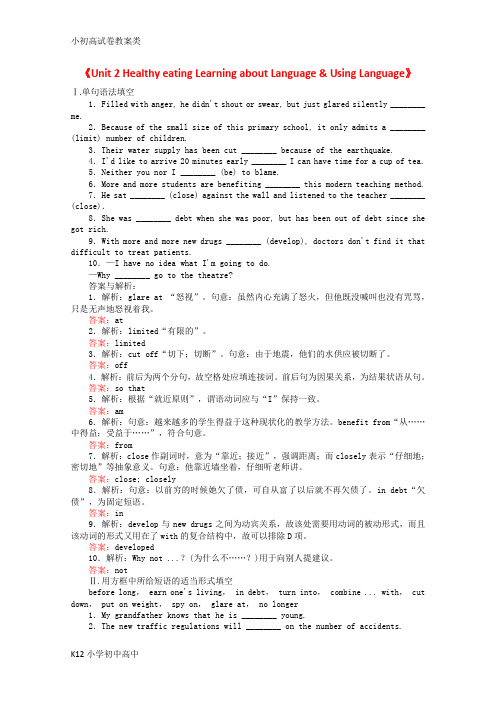
《Unit 2 Healthy eating Learning about Language & Using Language》Ⅰ.单句语法填空1.Filled with anger, he didn't shout or swear, but just glared silently ________ me.2.Because of the small size of this primary school, it only admits a ________ (limit) number of children.3.Their water supply has been cut ________ because of the earthquake.4.I'd like to arrive 20 minutes early ________ I can have time for a cup of tea.5.Neither you nor I ________ (be) to blame.6.More and more students are benefiting ________ this modern teaching method.7.He sat ________ (close) against the wall and listened to the teacher ________ (close).8.She was ________ debt when she was poor, but has been out of debt since she got rich.9.With more and more new drugs ________ (develop), doctors don't find it that difficult to treat patients.10.—I have no idea what I'm going to do.—Why ________ go to the theatre?答案与解析:1.解析:glare at “怒视”。
教育最新K122019年高考英语一轮抓纲务本 模块3 Unit 2 Language(含解析)牛津译林版
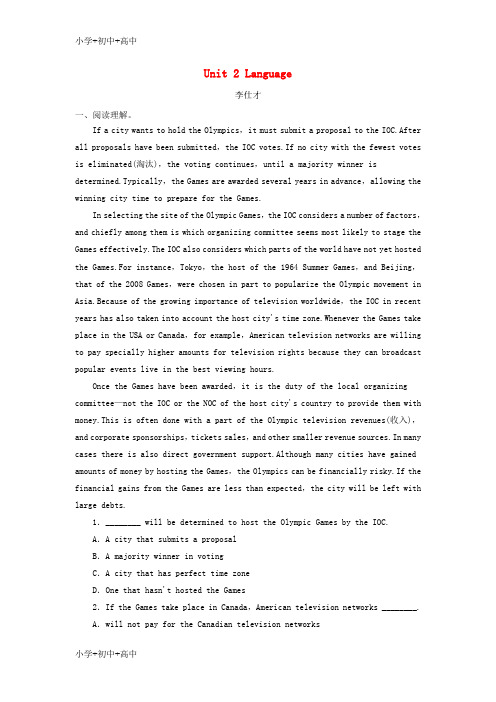
Unit 2 Language李仕才一、阅读理解。
If a city wants to hold the Olympics,it must submit a proposal to the IOC.After all proposals have been submitted,the IOC votes.If no city with the fewest votes is eliminated(淘汰),the voting continues,until a majority winner is determined.Typically,the Games are awarded several years in advance,allowing the winning city time to prepare for the Games.In selecting the site of the Olympic Games,the IOC considers a number of factors,and chiefly among them is which organizing committee seems most likely to stage the Games effectively.The IOC also considers which parts of the world have not yet hosted the Games.For instance,Tokyo,the host of the 1964 Summer Games,and Beijing,that of the 2008 Games,were chosen in part to popularize the Olympic movement in Asia.Because of the growing importance of television worldwide,the IOC in recent years has also taken into account the host city's time zone.Whenever the Games take place in the USA or Canada,for example,American television networks are willing to pay specially higher amounts for television rights because they can broadcast popular events live in the best viewing hours.Once the Games have been awarded,it is the duty of the local organizing committee—not the IOC or the NOC of the host city's country to provide them with money.This is often done with a part of the Olympic television revenues(收入),and corporate sponsorships,tickets sales,and other smaller revenue sources.In many cases there is also direct government support.Although many cities have gained amounts of money by hosting the Games,the Olympics can be financially risky.If the financial gains from the Games are less than expected,the city will be left with large debts.1.________ will be determined to host the Olympic Games by the IOC.A.A city that submits a proposalB.A majority winner in votingC.A city that has perfect time zoneD.One that hasn't hosted the Games2.If the Games take place in Canada,American television networks ________.A.will not pay for the Canadian television networksB.will be forbidden to broadcast live sporting eventsC.can't broadcast popular events live in the best viewing hoursD.are willing to pay much higher amounts for television rights3.According to the last paragraph,which following statement is true?A.The host city must be left with large debts.B.There is no financial risk in hosting the Olympic Games.C.The city may gain a lot of money.D.It is impossible that the host city couldn't make money.4.Which of the following can be the best title of this passage?A.Winner or loserB.Applying for host for the OlympicsC.How to host the Olympic GamesD.The Olympic Games【解题导语】本文是一篇说明文,主要介绍了申办奥运会的流程。
推荐学习K122019年高考英语一轮抓纲务本 模块3 Unit 2 Language(含解析)牛津译
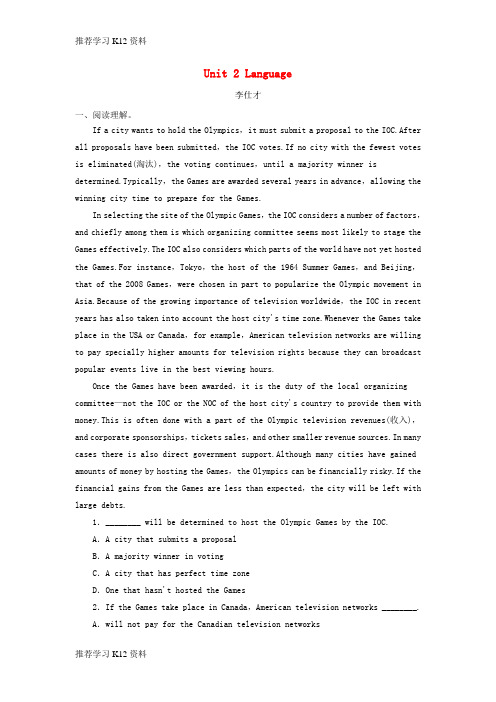
Unit 2 Language李仕才一、阅读理解。
If a city wants to hold the Olympics,it must submit a proposal to the IOC.After all proposals have been submitted,the IOC votes.If no city with the fewest votes is eliminated(淘汰),the voting continues,until a majority winner is determined.Typically,the Games are awarded several years in advance,allowing the winning city time to prepare for the Games.In selecting the site of the Olympic Games,the IOC considers a number of factors,and chiefly among them is which organizing committee seems most likely to stage the Games effectively.The IOC also considers which parts of the world have not yet hosted the Games.For instance,Tokyo,the host of the 1964 Summer Games,and Beijing,that of the 2008 Games,were chosen in part to popularize the Olympic movement in Asia.Because of the growing importance of television worldwide,the IOC in recent years has also taken into account the host city's time zone.Whenever the Games take place in the USA or Canada,for example,American television networks are willing to pay specially higher amounts for television rights because they can broadcast popular events live in the best viewing hours.Once the Games have been awarded,it is the duty of the local organizing committee—not the IOC or the NOC of the host city's country to provide them with money.This is often done with a part of the Olympic television revenues(收入),and corporate sponsorships,tickets sales,and other smaller revenue sources.In many cases there is also direct government support.Although many cities have gained amounts of money by hosting the Games,the Olympics can be financially risky.If the financial gains from the Games are less than expected,the city will be left with large debts.1.________ will be determined to host the Olympic Games by the IOC.A.A city that submits a proposalB.A majority winner in votingC.A city that has perfect time zoneD.One that hasn't hosted the Games2.If the Games take place in Canada,American television networks ________.A.will not pay for the Canadian television networksB.will be forbidden to broadcast live sporting eventsC.can't broadcast popular events live in the best viewing hoursD.are willing to pay much higher amounts for television rights3.According to the last paragraph,which following statement is true?A.The host city must be left with large debts.B.There is no financial risk in hosting the Olympic Games.C.The city may gain a lot of money.D.It is impossible that the host city couldn't make money.4.Which of the following can be the best title of this passage?A.Winner or loserB.Applying for host for the OlympicsC.How to host the Olympic GamesD.The Olympic Games【解题导语】本文是一篇说明文,主要介绍了申办奥运会的流程。
[配套K12]2017-2018学年高中英语 Unit 2 Poem Section 2 Learn
![[配套K12]2017-2018学年高中英语 Unit 2 Poem Section 2 Learn](https://img.taocdn.com/s3/m/b431a034581b6bd97e19ea1c.png)
Unit 2 Poem Section 2 Learning about LanguageⅠ.用used和exchange的相关短语填空导学号 698241121.The factory where Mr Li used to work was closed last week.2.He used to play games on the Internet, but now he is used to taking a walk after supper.3.My grandmother used to come here every Saturday evening as regular as clockwork.4.Silk was a common offering by the emperor to those tribes in exchange for peace.5.I'll exchange my apple for your orange.6.I wouldn't exchange my apple with him for anything.Ⅱ.用所给动词的适当形式填空导学号 698241131.If I had seen the movie, I would tell (tell) you all about it now.2. The old lady wasn't told the sad news,or she would have broken (break) down.3. It is about time that we had (have) lunch.4. It is necessary that we set (set) out right away.5. He acted as usual as if nothing had happened (happen).6. If only I had seen (see) the film!7. It is required that the students (should)learn (learn)a foreign language.8. I'm really very busy, otherwise I would go (go) there with you.9. If they had started (start) in the early morning,they would arrive in half an hour.10. If he were (be) alive now, he might have finished (finish) his scientific research on the bridge building three years ago.Ⅲ.单句改错导学号 698241141.If she studied harder, she would have passed the exam.studied前加had2.We would have won if we stayed up so late the night before.stayed前加hadn't3.My suggestion is that he would go there at once.would→should4.It is time that we go to the library.go前加should或go→went5.If only I am a bird!am→were6.Were he to leave yesterday, he would get there by Friday.Were he to leave→Had he left。
配套K12高中英语 Module 2 No Drugs Period 4 Listening and
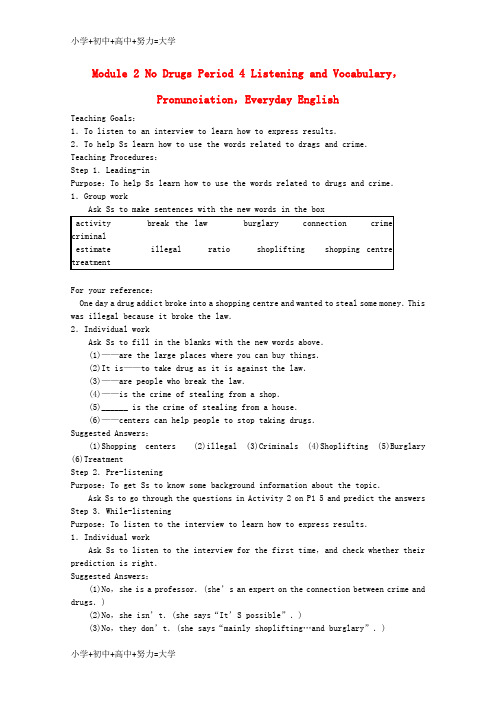
Module 2 No Drugs Period 4 Listening and Vocabulary,Pronunciation,Everyday EnglishTeaching Goals:1.To listen to an interview to learn how to express results.2.To help Ss learn how to use the words related to drags and crime.Teaching Procedures:Step 1.Leading-inPurpose:To help Ss learn how to use the words related to drugs and crime.1.Group workFor your reference:One day a drug addict broke into a shopping centre and wanted to steal some money.This was illegal because it broke the law.2.Individual workAsk Ss to fill in the blanks with the new words above.(1)——are the large places where you can buy things.(2)It is——to take drug as it is against the law.(3)——are people who break the law.(4)——is the crime of stealing from a shop.(5)______ is the crime of stealing from a house.(6)——centers can help people to stop taking drugs.Suggested Answers:(1)Shopping centers (2)illegal (3)Criminals (4)Shoplifting (5)Burglary (6)TreatmentStep 2.Pre-listeningPurpose:To get Ss to know some background information about the topic.Ask Ss to go through the questions in Activity 2 on P1 5 and predict the answers Step 3.While-listeningPurpose:To listen to the interview to learn how to express results.1.Individual workAsk Ss to listen to the interview for the first time,and check whether their prediction is right.Suggested Answers:(1)No,she is a professor.(she’s an expert on the connection between crime and drugs.)(2)No,she isn’t.(she says“It’S possible”.)(3)No,they don’t.(she says“mainly shoplifting…and burglary”.)(4)No,they don’t.(she says that last year“about 30,000 people went to…”.)(5)Yes,they are.(she says that 75%of the young people are men.)2.Individual workAsk Ss to listen to the tape again,and then fill in the blanks.Suggested Answers:(1)Marion Smith (2)professor (3)4 million(4)a hundred thousand (5)shoplifting,burglary(6)about 30,0003.Individual workAsk Ss to listen to the tape again,and then fill in the blanks.I:Good evening,and welcome to the show.With me in the studio is Professor Marion Smith,who is an expert on the _______ between _______ and _____.Good evening,Professor Smith.P:Good evening.I:First of all,how many people use_________ drugs in Britain?P:Possibly four million people.I:Really? Four million?P:Yes.I:How many of them ________ in order to pay for their drugs?P:we estimate that a hundred thousand people ______in order to pay for their__________.I:A hundred thousand?!That’S incredible.And what kinds of______ do they commit? P:Mainly ______ 一in other words,stealing from shops—and ________ ,stealing from houses.I:I see.P:And there’s another problem.Drug users get into trouble with the police for other reasons as well.I:What kinds of reasons?P:Well,you often see drug used in public places,一 _________ ,railway stations,for example—and some of the them behave SO badly that members of the public _________.Some people feel s0 _______when they see drug users that they call the police anyway.I:This is a really bad problem,isn’t it?P:Absolutely,but the good news is that drug users who go to_______ usually stoptheir_________activitiesI:How many addicts go to treatment centers?P:Last year,about 30,000 people went to drug treatment centers.I:Thirty thousand? That’s amazing.P:Yes,there are such a lot of people that there isn’t time_________ .I:What kind of people are they?P:Well,the majority are young people in their twenties.And about 75 percent of the young people are men.I:And do all these people live in cities?P:Oh no.The _________ of drug users in society is the same in cities and in the countryside.But they all have something in common.I:What is that?P:Drug users are more likely to _______ at sch001.I:Professor Marion Smith,thank you very much.P:Thank you.Suggested Answers:(1)connection (2)crime (3)drug addiction (4)illegal (5)break the law (6)steal (7)drug addiction (8)crimes (9)shoplifting(10)burglary(11)shopping centres (12)call the police (13)nervous (14)treatment centres (15)criminal (16)to help them all(17)ratio (18)get into troubleStep 4.Post-listeningPurpose:To enable Ss to know the dangers of taking drugs.Ask Ss to discuss the content of the listening material in groups.Q1.What’s the topic of the interview?Q2.What can we learn from the interview?Suggested Answers:(1)The connection between drugs and crime.(2)Taking drugs is illegal and it will be punished by the law.Step 5.PronunciationA sentence can express different feelings in different situations.Ask Ss to think how to express these feelings:(a) surprised(b)angry(c)happy(d)sad by using the sentence .Then listen to the tape and check it.Step 6.Everyday English1.Pair workAsk Ss to do Activity 1 on P18.’Suggested Answers:(1)3(2)1(3)1(4)3(5)2(6)2(7)3(8)3(9)42.Pair workAsk Ss to complete the sentences in Activity 2 on P18.Then listen and check whether the answers are fight.Suggested Answers:(1)I agree with you.(2)I couldn’t agree more. (3)Absolutely! (4)I totally agree with you. (5)Well,I’m not sure about that.(6)I’m not sure I agree withthat.(7)You can’t be serious!Step 7.Homework1.Ask Ss to make a survey about the information in the following form.2.Finish the rest of the exercises in the Workbook of the module.。
【配套K12】高中英语 Module 2 No Drugs Period 2 Reading and
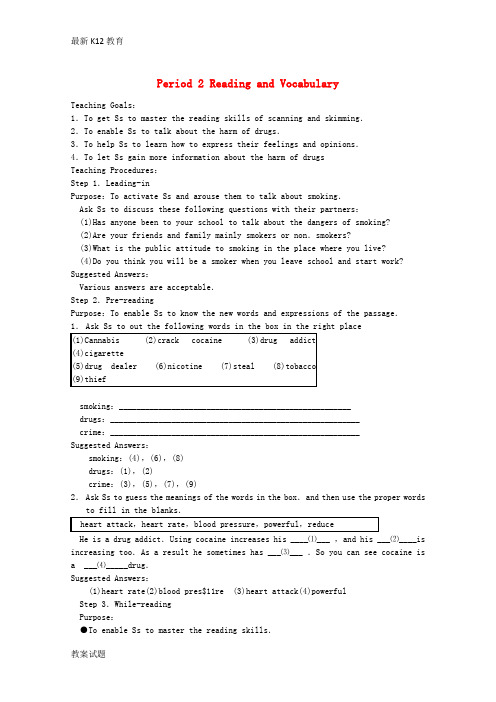
Period 2 Reading and VocabularyTeaching Goals:1.To get Ss to master the reading skills of scanning and skimming.2.To enable Ss to talk about the harm of drugs.3.To help Ss to learn how to express their feelings and opinions.4.To let Ss gain more information about the harm of drugsTeaching Procedures:Step 1.Leading-inPurpose:To activate Ss and arouse them to talk about smoking.Ask Ss to discuss these following questions with their partners:(1)Has anyone been to your school to talk about the dangers of smoking?(2)Are your friends and family mainly smokers or non.smokers?(3)What is the public attitude to smoking in the place where you live?(4)Do you think you will be a smoker when you leave school and start work? Suggested Answers:Various answers are acceptable.Step 2.Pre-readingPurpose:To enable Ss to know the new words and expressions of the passage.1.Ask Ss to out the following words in the box in the right placesmoking:_____________________________________________________drugs:_________________________________________________________crime:_________________________________________________________Suggested Answers:smoking:(4),(6),(8)drugs:(1),(2)crime:(3),(5),(7),(9)2.Ask Ss to guess the meanings of the words in the box.and then use the proper words to fill in the blanks.He is a drug addict.Using cocaine increases his ____⑴___ ,and his ___⑵____is increasing too.As a result he sometimes has ___⑶___ .So you can see cocaine is a ___⑷_____drug.Suggested Answers:(1)heart rate(2)blood pres$11re (3)heart attack(4)powerfulStep 3.While-readingPurpose:●To enable Ss to master the reading skills.●To enable Ss to talk about the harm of drugs.1.SkimmingAsk Ss to read the opening paragraphs of two different articles on P1 2 and decide what the topic of each article is.Choose the topic from the list in Activity 2 on P12.Suggested Answers:Article 1:A Drag Addict and His StoryArticle 2:The Dangers of Using Cocaine2.ScanningAsk Ss to read the articles again,and then decide if these 8enterlees are true(T)or false(F).(1)Cocaine can be smoked and also injected.(2)People who inject cocaine are in more danger if they share needles.(3)Cocaine makes your heart go more slow]y.(4)Smoking era(3k cocaine can change people’s behavior.(5)Crack cocaine is a powerfully addictive as cannabis.(6)Drug addicts will feel terribly painful without drugs.(7)All cocaine user8 have heart attacks.(8)Adam followed what the doctor said.(9)Now Adam works in a drug treatment centre.Suggested Answers:(1)T(2)T(3)F(4)T(5)F(6)T(7)F(8)T(9)T3.Pair workAsk Ss to complete the questions and answer about Adam Rouse in Activity 6 on P13.Suggested Answers:(1)How old,15(years old)(2)did he use,(He used)cannabis(3)did he buy,(He bought it from)a man in the street/a drug dealer(4)offered/sold him,(It was)crack cocaine(5)He broke into a house and stole things(6)to the police station.(7)Yes,he did..(8)does Adam,(He works)in a(:entre for drug addicts.Step 4.Post-readingPurpose:To let Ss know the structure of the passage.Suggested Answers:(1)The Dangers of Using Cocaine.(2)Cocaine is a powerfully addictive drug.(3)Inject cocaine or smoke it.(4)Increase heart rate and blood pressure;have heart attacks:have anti—social behavior.Step 5.Language PointsPurpose:To train Ss’language capacity.Ss are divided into four groups.Ask each group to discuss the important and difficult language points.1.used to do sth“过去经常做某事”,其否定式为didn’t use to do sth,或者usedn’t to do sthE.g. She didn’t use/usedn’t to make that mistake.※[拓展]use的习惯用法(1)be/get used to sth/doing sth习惯做某事(2)be used to do sth被用来做某事(3)It’s no use doing sth做某事没用2.share sth with sb和某人分享某物E.g.(1)I’ll share joys and sorrows with you.(2)It’s raining.Shall I share the umbrella with you.93.offer sb sth=offer sth to sb“给某人提供某物”,其意义相当于“supply/provide sb with sth”E.g.(1)He offered his life to the country.(2)He offered me a job in his company,but I didn’t accept it.※[拓展]offer的相关词组①offer to do sth主动提出做某事E.g. He offered to lend his bike to me.②offer sb money for sth向……索价;还价E.g. He offered 30,000 dollars for the house.4.take one’s advice=follow one’s advice接受某人意见E.g. Take my advice——finish the work like this..※[拓展]advise vt.建议,通常有如下固定搭配:(1)advise doing sth.E.g. He advises me to go to the dentist without delay.(2)advise sb to do sthE.g. He advises going to the dentist.Step 6.homeworkFinish the Vocabulary exercises on P74.。
高考英语总复习基础考点聚焦第一部分模块3Unit2Language知能演练轻松闯关
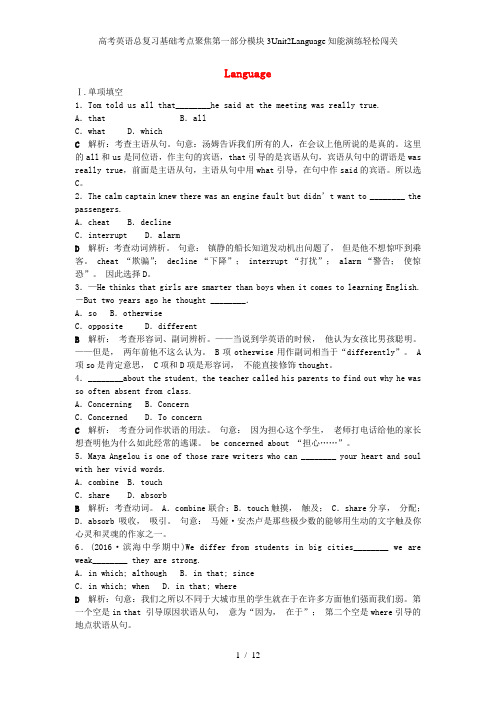
LanguageⅠ.单项填空1.Tom told us all that________he said at the meeting was really true.A.that B.allC.what D.whichC解析:考查主语从句。
句意:汤姆告诉我们所有的人,在会议上他所说的是真的。
这里的all和us是同位语,作主句的宾语,that引导的是宾语从句,宾语从句中的谓语是was really true,前面是主语从句,主语从句中用what引导,在句中作said的宾语。
所以选C。
2.The calm captain knew there was an engine fault but didn’t want to ________ the passengers.A.cheat B.declineC.interrupt D.alarmD解析:考查动词辨析。
句意:镇静的船长知道发动机出问题了,但是他不想惊吓到乘客。
cheat “欺骗”;decline “下降”;interrupt “打扰”;alarm “警告;使惊恐”。
因此选择D。
3.—He thinks that girls are smarter than boys when it comes to learning English. -But two years ago he thought ________.A.so B.otherwiseC.opposite D.differentB解析:考查形容词、副词辨析。
——当说到学英语的时候,他认为女孩比男孩聪明。
——但是,两年前他不这么认为。
B项otherwise用作副词相当于“differently”。
A 项so是肯定意思, C项和D项是形容词,不能直接修饰thought。
4.________about the student, the teacher called his parents to find out why he was so often absent from class.A.Concerning B.ConcernC.Concerned D.To concernC解析:考查分词作状语的用法。
高考英语总复习 32Unit 2 Language课件(江苏专用)
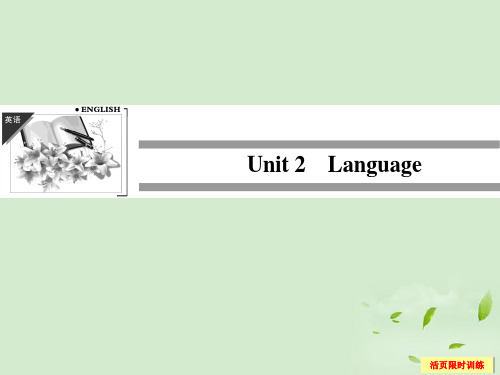
________people's concern over food safety.
•(2011·重庆卷·单项填空29)
•A.to raise
B.raising
•C.to have raised
D . having
raised
•答案 A
活页限时训练
•④Voices were ________ as the argument
活页限时训练
辨析raise/rise/arise
原形
用法
raise
及物
rise
不及物
arise
不及物
中文意思 举起;提高 唤起;饲养 上升;起身
出现; 发生; 升起
过去式 过去分词
raised raised
rose
risen
arose arisen
活页限时训练
•
—看看高考怎么考
•① They raise their eyebrows( 挑 起 眉 毛 ) ,
活页限时训练
•语境助记——词不离句,句不离段 •The official representative made great contributions to the process of this program. Despite many classes disagree with it.What they did really made a great difference.
活页限时训练
control n.&v.控制
•【 课 本 原 句 】 The most important contribution was from the Normans , a Frenchspeaking people who defeated England and take control of the country in 1066.(P22) •最重要的贡献是来自诺曼人,一个说法语的 民族在1066年打败并控制了英国。
【K12学习】高考英语单元知识点复习Unit 2
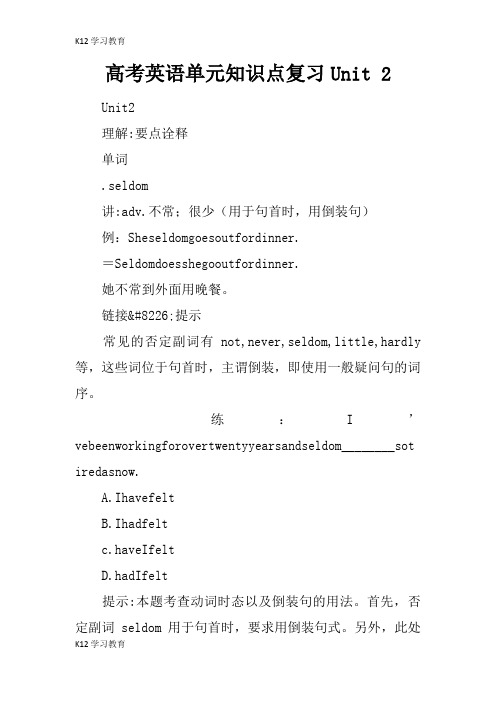
高考英语单元知识点复习Unit 2Unit2理解:要点诠释单词.seldom讲:adv.不常;很少(用于句首时,用倒装句)例:Sheseldomgoesoutfordinner.=Seldomdoesshegooutfordinner.她不常到外面用晚餐。
链接•提示常见的否定副词有not,never,seldom,little,hardly 等,这些词位于句首时,主谓倒装,即使用一般疑问句的词序。
练:I’vebeenworkingforovertwentyyearsandseldom________sot iredasnow.A.IhavefeltB.Ihadfeltc.haveIfeltD.hadIfelt提示:本题考查动词时态以及倒装句的用法。
首先,否定副词seldom用于句首时,要求用倒装句式。
另外,此处的动作表示到目前为止的情况,所以使用现在完成时。
答案:c2.disappointv.使失望;阻碍(计划等)实现讲:disappointedadj.失望的disappointingadj.令人失望的disappointmentn.失望;令人失望的人或事例:Hisbehaviourdisappointedme.他的行为令我失望。
Iwasdisappointedat/in/withtheresult.我对这个结果很失望。
Hewasdisappointedtohearthenews.他听了这个消息而感到失望。
Howdisappointingthenewsis!这消息真令人失望!Tomydisappointment,hefailedagain.令我失望的是,他又失败了。
youareadisappointment.你真令人失望(你是个令人失望的人)。
链接•提示下列动词都有“使某人……”的意思:interest,surprise,frighten,please,excite,move,并且都可以构成-ed和-ing两种形容词。
- 1、下载文档前请自行甄别文档内容的完整性,平台不提供额外的编辑、内容补充、找答案等附加服务。
- 2、"仅部分预览"的文档,不可在线预览部分如存在完整性等问题,可反馈申请退款(可完整预览的文档不适用该条件!)。
- 3、如文档侵犯您的权益,请联系客服反馈,我们会尽快为您处理(人工客服工作时间:9:00-18:30)。
难点
教法及教具 教师主导活动 Second period Step 1: Personal show Write down the words according to the definition 1. confusing 1. difficult to understand; puzzling 2. consist 2. be made up of 3. create 3. cause something to exist 4. replace 4. take the place of 5. simplify 5. make (sth) easy to do or understand; make simple 6. occupy 6. live in or have possession of 7. contribute to 7. help to cause sth 8. distinction 8. difference or contrast between one person or thing and another 9. combine 9. join or mix together to form a whole 10. indicate 10. show sth, especially by pointing 11. convenient 11. fitting in well with people's needs or plans; giving no trouble or difficulty; suitable 12. suitable for the purpose for which it was made; useful 12. practical Step 2: Language focus 1. occupy vt.占据,充满(时间,空间,某人的头脑等);(军事)占领(国家,阵地 等);占用;占有(房屋,土地等) 知识探究: 归纳整理: His speech occupied only 3 minutes. 他的演讲 ● take up or fill 仅占用了三分钟。 (time, space, sb’s A bed occupied the corner of the room. 一张床 mind) ”占据,充满 占据了房间的一角。 (时间,空间,某人 The army occupied the enemy’s capital. 军队 的头脑等) 占领了敌人的首都。 ● take possession The family has occupied the farm for many years. of and establish 这家人占用这个农场已经多年了。 troops in (a They occupy the house next door. 他们住在隔壁。 country, position, How does he occupy himself now that he is etc.) (军事) 占领 (国 retired? 既然他退休了,他在忙些什么呢? 家,阵地等) The workers were occupied in building new ● live in or have houses. 工人们正在忙碌着盖新房子。 possession of ( a He occupies an important position in the house, land, etc.) Ministry of Education. 他在教育部充任要职。 占用,占有(房屋, She is occupied in writing a novel. 她忙于写 土地等) 小说。 ● occupy oneself K12 小学初中高中初高试卷教案类 He occupied himself with various activities. 他终日从事各种社交活动。 social ( in doing sth. / with sth.)
题练落实: C) 1. _______ reading history books, he even didn’t notice me coming. A. Occupied with B. Occupying with C. Occupied in D. Occupying in B) 2. ______ himself _____ the project, he had no time to go back home. A. Occupied; with B. Occupying; with C. Occupied; in D. Occupying; in A) 3. When I arrived I saw the place was already ______ by two strangers in uniforms. A. occupied B. conquered C. possessed D. owned B) 4. I’m afraid that Miss Liu can’t help teach you how to send an e-mail, for she is _____ herself in typing a report for the boss. A. devoting B. occupying C. putting D. finding 解析 occupy oneself in (doing) sth.忙于…… 联想拓宽: 他在忙于写一本小说。He was occupied with a novel / in writing a novel. = He occupied himself with a novel / in writing a novel. 忙于…,专心于… Occupy oneself in doing sth. / with sth. = be occupied in doing sth. / with sth. = be busy in doing sth. / with sth.= be absorbed in doing sth. Occupation (n.) (1) Teaching is my occupation. 职 业 , 专 业 = I am a teacher by occupation. (2) No one is yet in occupation of the house. 占有 Occupied (adj.) 在使用中,已占有,不空闲 (1) 占用:占用(时间或空间) : a lecture that occupied three hours. 长 达三个小时的讲座 (2) 居住:在…居住或长期居住 (3) 占有:占有或位居(办公室或职位) (4) 占据:通过征服手段或相似手段获得并保持对其控制 (5) 忙于:从事、雇佣或(自己)忙于: occupy himself with sculpting. 他自己忙于雕刻 lose one’s occupation 失业 have no fixed occupation 无固定职业 be occupied with / in 从事/ 专心与…;忙于… 2. consist 知识探究: 归纳整理: This club consists of more than 200 consist of 由…组组,组… members. 这个俱乐部由 200 多位会员组成。 组组 ( = be made up of) The beauty of Venice consists in the style consist in=lie in 在于, of its ancient buildings.威尼斯之美在于 存在于 其古建筑风格。 consist with 与…一 His actions do not consist with his words. 组,组组 他言行不一。 K12 小学初中高中
小初高试卷教案类
unit 2 language
课题 教学目标 重点 unit 2 language reading 2 Important words and phrases ; sentence patterns Important words and phrases ; sentence patterns 教 学 内 容 学生主 体活动 Important words and phrases,sentence patterns 个案调整 课型 复习
小初高试卷教案类 题练落实: A) 1. Our class __ ______ fifty-five students at that time. A. consisted of B. was consisted of C. made up of D. was consisting of B) 2. As we know, a chess set ________ 32 chessmen. A. consists in B. consists of C. is consisted in D. is consisted of B) 3. The mall _______ of eight kilometers of tunnels, ______ with shops, art galleries and even a water park. A. consisted; fills B. consists; f illed C. consisting; filling D. consists; is filled 解析 consist of 由……组成,无被动语态;be filled with 充满,在 本句中充当定语。 联想拓宽: consist of 一般不用于进行时,且只能用主动语态; be made up of 只用被动 形式。 易混辨异 consist of, make up, be made up of 这三个词都有“组成”的意思,但在用法上有所不同: (1)consist of 表示“……由……组成”的意思,不使用被动语态 , 相当于 include 的意思。 (2)make up 表示“……组成……”,为主动形式,表示“部分组成一个整体” 的意思。另外 make up 还有“化妆;编造;占……(比例);弥补”等意思。 (3)be made up of 表示“……由……组成”,这里为被动形式,表示“一个整 体由几个部分组成”的意思。 This club consists of more than 200 members. =This club is made up of more than 200 members. =More than 200 members make up this club. 这个俱乐部由 200 多名 成员组成。 3. contribute 知识探究: 归纳整理: Does smoking contribute to lung cancer? 吸 contribute to 是… 烟会导致肺癌吗? 组组因组一,组… Your suggestion has greatly contributed to 组组组组. 向… the accomplishment of our work. 组 组;组…组组 组组组组组组组组组组们工作的完成。 make contributions / He contributed a large sum of money to the a contribution to hospital. 组组组组组组组组组组组 对…组组组组 He made an outstanding contribu tion to science. 他为科学作出了卓越的贡献。 题练落实: A) 1. Would you like to _______ the hospital rebuilding fund? A. make a contribution to B. contribute C. donate D. give away B) 2. He ________ it his spare time as well as his spare money. A. gave away B. devoted to C. contributed with D. do nated for C) 3. Science and technology have ______ in important ways to the improvement of agricultural production. A. attached B. assisted C. contributed D. witnessed K12 小学初中高中
